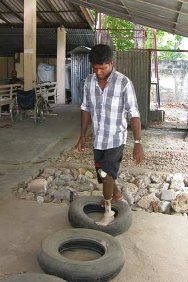Sri Lanka: adapting to new challenges
26-11-2010 Interview
A year and a half after the conflict in Sri Lanka ended, the ICRC has been scaling down its activities in the country. Yves Giovannoni, the new head of ICRC delegation, explains which activities will be phased out and which are likely to endure.

Yves Giovannoni took up his duties as the new head of the ICRC delegation in Sri Lanka on 15 November. He has worked for the ICRC for nearly 25 years in various African, Middle Eastern, Latin American and Asian countries. He has also served as the ICRC's head of operations for Latin America and the Caribbean.
The ICRC is known for its work in conflict situations. Since the conflict in Sri Lanka ended in May 2009, what role does the ICRC play in that country now?
The ICRC continues to address needs of a humanitarian nature resulting from the conflict, just as it has done in many other countries after an armed conflict has ended. In Sri Lanka, some physically disabled people will require artificial limbs for as long as they live. People who were displaced during the final stages of the conflict and are now gradually returning to their homes need help rebuilding their lives. Although the most urgent needs may subside in the few years following the conflict, meeting other needs requires a continuous effort. There are, for example, the needs of people arrested during the conflict and who remain in custody, whom the ICRC visits and will continue to visit regularly.
At all times, including a transition phase such as this one, the ICRC carries out its work in full transparency with the authorities. It brings aid directly to those who need it, then endeavours to assess whether the aid was appropriate and whether gaps remain to be filled. The confidential dialogue it maintains with the authorities is standard procedure for the ICRC, and enables it to reach out and maintain access to people affected by insecurity, violence and armed conflict.
According to media reports, the government has requested you to close your offices in Vavuniya and Jaffna. Is this true?
Yes, however the date has still to be decided and it will depend on the needs, in humanitarian terms, and the administrative and logistical delays that meeting such needs will inevitably entail. This will soon be discussed with the relevant authorities based on mutual considerations.
Is the ICRC going to scale down its operations in Sri Lanka?
Yes, definitely. I do not see the ICRC continuing with the major setup it had during the conflict years, when the need for humanitarian aid was considerable. Fortunately, most of the direct consequences of the conflict are gradually disappearing, although physically disabled people and detainees will need help for many years. We have been discussing the eventual phaseout of emergency relief with the government authorities, the Sri Lanka Red Cross Society and other agencies concerned. It is clearly understood that there will be a reduction of activities.
What are your intentions for future ICRC activities in the country?
In the longer term, I expect that certain activities, such as the support we provide for limb-fitting and rehabilitation services for the physically disabled, will continue, as will our visits to detainees. Together with the Sri Lankan government and other institutions we would like to continue to promote better understanding of humanitarian norms and their inclusion in the rules and regulations of the armed forces and police – especially since Sri Lanka is a major participant in United Nations peace-keeping operations, where these international norms apply. The ICRC has worked and continues to work in close cooperation with the Sri Lanka Red Cross Society and other partners from the International Red Cross and Red Crescent Movement. We will continue to do so in future as well. These are my intentions as I take up my duties. I will of course have to reassess them periodically.


